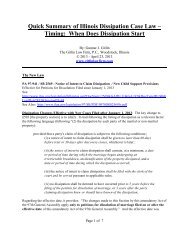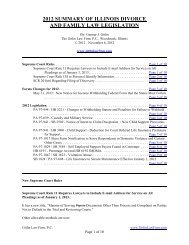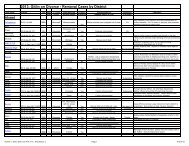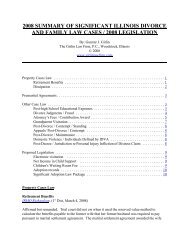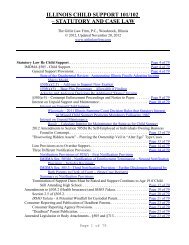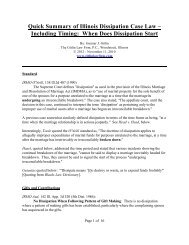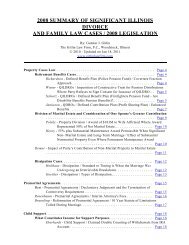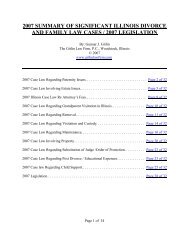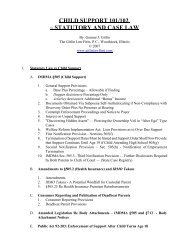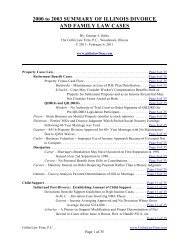Illinois Attorney's Fees and the Leveling the Playing Field Act
Illinois Attorney's Fees and the Leveling the Playing Field Act
Illinois Attorney's Fees and the Leveling the Playing Field Act
Create successful ePaper yourself
Turn your PDF publications into a flip-book with our unique Google optimized e-Paper software.
Prior to <strong>the</strong> entry of judgment in a case, attorneys face difficulties in preparing fee<br />
petitions that are sufficiently detailed, because fees typically continue to accrue<br />
throughout <strong>the</strong> final hearing or settlement negotiations that culminate in <strong>the</strong><br />
judgment. Under Konchar, to preserve clients' rights to bring fee petitions later,<br />
attorneys must submit initial requests for fees long before <strong>the</strong> resolution of <strong>the</strong><br />
issues raised by <strong>the</strong> postdecree petitions, <strong>and</strong> <strong>the</strong>n prepare later, more detailed<br />
supplements immediately before <strong>the</strong> final hearings, a practice that results in <strong>the</strong><br />
needless expenditure of attorneys' labor <strong>and</strong> clients' funds.<br />
Moreover, <strong>the</strong> need for a petition for attorney fees may depend in part on <strong>the</strong> trial<br />
court's resolution of <strong>the</strong> postdecree request for relief. For instance, parties who<br />
receive financial relief on <strong>the</strong> merits may choose to forgo filing petitions,<br />
knowing that <strong>the</strong>ir financial situations are no longer likely to justify awards of<br />
contribution. *** Under <strong>the</strong> current practice, however, parties cannot wait until<br />
<strong>the</strong> issues are resolved before deciding whe<strong>the</strong>r to seek contribution; if <strong>the</strong>y want<br />
to preserve <strong>the</strong> right to seek it at all, <strong>the</strong>y must file petitions in advance. This<br />
creates an unnecessary drain on <strong>the</strong> resources of <strong>the</strong> courts <strong>and</strong> <strong>the</strong> parties.<br />
Blum concluded:<br />
In sum, we reconsider <strong>the</strong> holding of Konchar <strong>and</strong> hold that <strong>the</strong> time limits of<br />
section 503(j)(1) of <strong>the</strong> <strong>Act</strong> do not apply to petitions for contribution to attorney<br />
fees in postdecree proceedings. Ra<strong>the</strong>r, in conformity with <strong>the</strong> language of section<br />
508(a) of <strong>the</strong> <strong>Act</strong>, such petitions are timely if filed "at <strong>the</strong> conclusion of <strong>the</strong> case,"<br />
that is, within 30 days after <strong>the</strong> date on which judgment is entered.<br />
Macaluso — Case Contrary to Konchar Holding In Post-Divorce Proceedings No Bar Until<br />
30 Days after Entry of Judgment: For a while, <strong>the</strong> law seemed clear in this regard. A fee<br />
petition, even in post-judgment proceedings, must be filed before <strong>the</strong> final judgment is entered.<br />
However, <strong>the</strong> recent Macaluso v. Macaluso, 334 Ill.App.3d 1043, 779 N.E.2d 250, 268 Ill.Dec.<br />
636 (3rd Dist. 2002), GDR 02-55, decision, lends even less clarity to <strong>the</strong> issue. It disagreed with<br />
Konchar <strong>and</strong> held that a petition for contribution fees in post-judgment proceedings need not be<br />
filed before final judgment is entered, <strong>and</strong> <strong>the</strong> a petition may be filed at any time before <strong>the</strong> trial<br />
court loses jurisdiction — generally following <strong>the</strong> 30 day rule. Macaluso reasoned that <strong>the</strong><br />
timing requirements of <strong>the</strong> contribution statute do not apply to post-divorce matters because<br />
Section 503(j)'s references to "<strong>the</strong> final hearing on all o<strong>the</strong>r issues between <strong>the</strong> parties,” is<br />
specific to <strong>the</strong> bifurcated hearing required in pre-decree proceedings. I believe <strong>the</strong> Macaluso<br />
decision may be <strong>the</strong> better reasoned decision. Never<strong>the</strong>less, we have a clear conflict among <strong>the</strong><br />
districts due to <strong>the</strong> fact that <strong>the</strong> legislation never really was drafted with post-divorce proceedings<br />
in mind.<br />
Lindsey-Robinson — First District Case Holding that Right to Object May be Waived by<br />
Participation <strong>and</strong> No Objection: Muddying <strong>the</strong> waters even more as to <strong>the</strong> timing issue is <strong>the</strong><br />
IRMO Lindsey-Robinson, 331 Ill.App.3d 261, 265 Ill.Dec. 17, 771 N.E.2d 976 (1st Dist., 1st Div.<br />
Gunnar J. Gitlin Gitlin Law Firm, P.C. www.gitlinlawfirm.com




